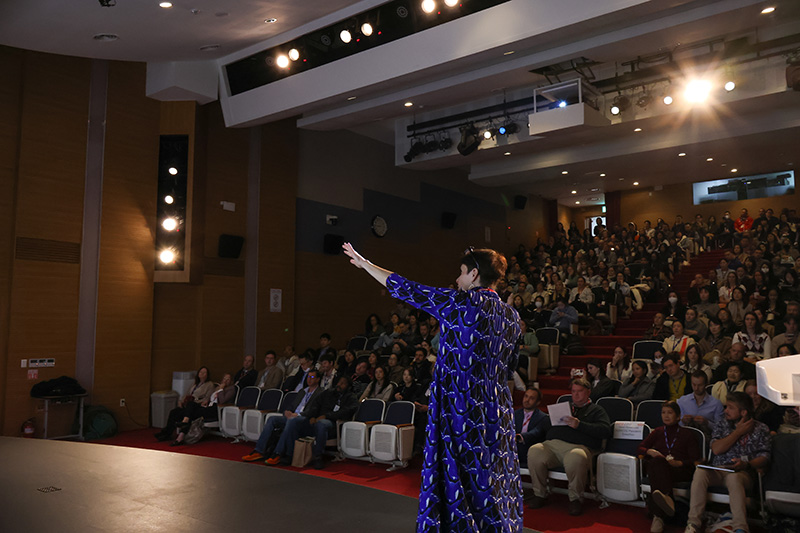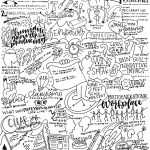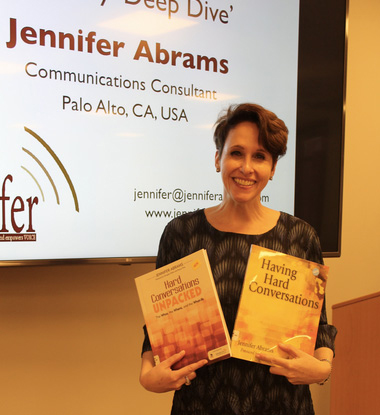Our ability to communicate effectively and our willingness to engage respectfully with one another matters for the health of the school and the collective well-being of all within it. These workshops offer strategies, tools and resources for participants to and become even more effective professionals in our adult to adult communication.
For deeper impact, start the learning at step 1. The full series of workshops can be offered over one, two or three years to better align with the professional learning time allotted in schools. And please note: A stand-alone workshop, on Zoom or in person, or the creation of a video series around a specific content to be used asynchronously are possible options.
Workshops can be virtual (90 minutes or 3 hours) or in person (3 hours or 6 hours).
For even greater impact, augment the work with coaching of both individuals and groups in leadership positions who are in charge of implementing the work systemically.

“We all need to have a sense of collective responsibility to learn how to speak professionally in our workplaces…no one is off the hook. The students are watching us.”
Jen Abrams, Hard Conversations Unpacked
It is critically important for a healthy, professional school culture, and for student growth that we strive to develop ourselves, not just as educators, but also as emotionally intelligent, psychologically mature systemically aware human beings. What can we do to be bigger and better versions of ourselves? This workshop, based on Jennifer’s new book, Stretching Your Learning Edges: Growing (Up) at Work, will introduce us to adult developmental theory and to five focused ways we can develop ourselves at work.
We will build our skills to:
Workshop Offering: Stretching Your Learning Edges: Growing (Up) at Work Zoom Book Study
The above workshop can be offered as a Zoom book study. Over 3, 4 or 6 75-90 minute sessions, participants dip into the book and its facets, gaining understanding of the concepts and creating plans for individual, team and system next steps.
These workshops go hand in hand with Step 2b: Clarity and Communication of Purpose, Plans and Programs and can be taken in any order.
Workshop: Engaging in Reciprocity: Being a Value Add Team Member
As an individual team member, your ability to collaborate, your willingness to engage thoughtfully and respectfully with the collective, and your capacity to engage in reciprocity are critical to the work you do in schools. These skills matter for teaching, the health of the school, and the collective well-being of all who are taught and work in a school. This workshop reviews the research around the need to engage in reciprocity and digs into the mindset, skills and capacities to do so effectively.
Workshop: Being In Relationship: Communication Basics
This foundational program is designed for all professionals in any role interested in learning and reviewing basic communication skills that build more trust in relationships. The workshop will provide skills to change personal behaviors within one’s sphere of control that can increase trust in everyday interpersonal and group interactions.
Workshop: Know Your Identity: Inclusion Skills for Effective Teams
We know from experiences that aging does not necessarily increase self-awareness. Knowing yourself is an ongoing journey of discovery and it doesn’t happen without commitment. This workshop looks at the concepts of belonging and inclusion for all. It offers moments of reflection, discussion so we can see even more intentionally how our identities impact our work on teams.
Workshop: Suspending Certainty and Building Resiliency: Two Key Skills for Team Members
How do I seek others’ input so I have a fuller picture of any given situation? This question aligns with the idea of Suspending Certainty – that our way is ‘a’ way, not ‘the’ way. Combine this with the skill of building one’s resilience – being able to self-regulate instead of ‘emotionally polluting’ an interaction and you have two essential skills for a healthy, professional learning culture for adults. This workshop looks at both skills through readings, discussions and self-assessments.
Workshop: Taking Responsibility for Your Side of Interactions
Taking responsibility for one’s language and behavior during interactions, as well as working to engage in solution-focused conversations strengthens the effectiveness of teams and supports engagement with ‘intellectual friction’ not ‘social friction.’ This workshop digs into the skillset needed to help team members be accountable for what is within their power linguistically and behaviorally.
Workshop: Being Generationally Savvy: Working Effectively Across Generations
Have you noticed your newer employees feel and look and act differently than novice colleagues you remember? Are you hearing of communication challenges between colleagues of different ages? Are you becoming aware more employees want a life-work balance vs. a work-life balance? Generational factors might be coming into play. Who are these four generations in our workplaces? What are their strengths and needs? What structures and communication protocols should we design to work well with them all? And, what knowledge do we need to help every group thrive? Using Jennifer’s book, The Multigenerational Workplace: Communicate, Collaborate and Create Community, this workshop will provide tools, resources on this increasingly intriguing topic.
Participants will learn how to:
Click here to read the chapter 1 summary of the Generations from The Multigenerational Workplace book.
This step, which works in a ‘chicken and egg’ way with Step 2a: Collaboration Skills, addresses that question. Schools can be doing work on Step 2a and Step 2b simultaneously.
Workshop: Being a Facilitator/Team Leader – What Does It Take?
We have credentials to teach yet becoming a division head, department chair, or team leader requires different set of skills. In this session participants will discuss the role being a capable and credible “group leader” and the skill set that goes with this specific role of leading, navigating and building a collaborative and professional culture within their workplace.
Workshop: Gaining Clarity Around Our Communications: Messaging Effectively
We have initiatives we want to roll out, mandates to fulfill, and projects to design. Yet with how fast we move in education these days, we don’t spend enough time on our communication around those projects and we end up being less successful as we could be in getting our messages across. We need to build up a skill set of messaging capabilities, ‘resistance management’ strategies and for the sake of our health, our ‘stress tolerance.’ This workshop will provide cognitive, social and psychological resources to help you communicate more effectively, confidently and collaboratively about whatever project or initiative you are undertaking.

This step is best taken once work from Step 1 and 2 have been done at your school.
Workshop: Having Hard Conversations
As administrators, coaches or colleagues, we often come up against situations where difficult topics must be addressed. What do we know about the best strategies for those moments? What questions should we be asking ourselves before we speak, and what environments are best for when we do speak? Based on Jennifer’s book, Having Hard Conversations, and her work with conflict and interpersonal communication, this session will provide participants with action plans and scripting tools for having those necessary hard conversations.
Participants will learn how to:
 Check out this graphic recording done by a participant during one of these presentations.
Check out this graphic recording done by a participant during one of these presentations.
Workshop: Hard Conversations Unpacked
Continuing the learning in the first Having Hard Conversations workshop, Hard Conversations Unpacked is an extension and deepening of the work of becoming more comfortable with the energy of conflict. The workshop revisits the key elements of the book, Having Hard Conversations, such as the outcome mapping and scripting protocol, and goes deeper to provide additional strategies for being more confident and compassionate when faced with situations involving conflict. (Prerequisite: Having Hard Conversations)
Workshop: Self-Paced Having Hard Conversations at EduSpark
Jennifer’s asynchronous book study on Having Hard Conversations is hosted by EduSpark. In it you go through the 9 videos of no more than 15 minutes each. Each video is Jennifer guiding you through your own book study or personal workshop and includes discussion questions. Learn more here.
Workshop: Hard Conversations with Parents and Caregivers

Given this time of so much change around the world, difficult topics must be addressed with parents or guardians of those we teach in our schools. What do we know about the best strategies for these specific moments? What questions should we be asking ourselves before we speak, and what language is best for when we do speak? Based on Jennifer’s books, Having Hard Conversations, and Hard Conversations Unpacked, and her work with conflict and interpersonal communication, this session will provide participants with planning and scripting tools for having those necessary humane and growth producing conversations with caregivers at this time of unpredictability.
Participants will:
Yes, you can request that Jennifer work with you to facilitate just one of the several workshops she is offering.
It is not required to offer a series.
Where can I learn more about the ideas that you are sharing?
If you would like a short explanation about the overarching ideas in Stretching Your Learning Edges: Growing (Up) at Work, please read:
There is an “I” In Team – Being a Better Team Player
If you would like more information about the specific mindsets in Stretching Your Learning Edges: Growing (Up) at Work, please read:
Suspend Certainty: Own Your Limits
Take Responsibility for Your Communications
If you would like more information about communicating your initiatives effectively, please read:
If you would like more information about Having Hard Conversations, please view: